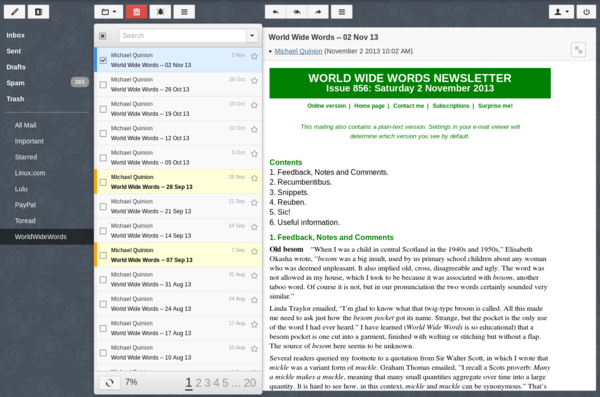Rainloop: Lightweight Webmail Client

Productivity Sauce
Instead of relying on the web-based interface offered by your email provider, you can deploy your own webmail client using Rainloop. This fast and lightweight application is easy to deploy and features a polished interface. Deploying Rainloop on a server is easy. Run the following commands to create the rainloop directory in the server's root (in this case, it's /var/www), set the correct permissions and owner, and install Rainloop:
mkdir /var/www/rainloop
cd /var/www/rainloop
find . -type d -exec chmod 777 {} \;
find . -type f -exec chmod 666 {} \;
chown -R www-data:www-data .
wget -qO- http://repository.rainloop.net/installer.php | phpOnce you've done that, point your browser to http://127.0.0.1/rainloop/?admin (where 127.0.0.1 is the actual IP address or domain name of the server), and log in using the admin user name and the 12345 password. This drops you into the administration interface, where you can configure Rainloop's settings. The web-based mail client can handle multiple domains (i.e., you can use Rainloop to access email accounts from different email providers), and the application has a couple of domains preconfigured and ready to go, including Gmail and Yahoo! Mail. To add other domains, switch to the Domains section, press the Add Domain button and provide the required information. Rainloop doesn't provide native support for multiple users, but the application uses Facebook, Google, and Twitter for authentication, thus allowing users to log into Rainloop via these social services. In addition to that, Rainloop can be intergrated with Dropbox for attaching files directly from the Dropbox storage. To enable this functionality, switch to the Social section and configure the required settings (see Rainloop documentation for further info).
Using Rainloop couldn't be easier. Point your browser to http://127.0.0.1/rainloop, log in using your email credentials, and you should see Rainloop's interface in all its beauty. Since the application is not overloaded with features, you shouldn't have trouble figuring out how to use it. While Rainloop has a lot going for it, the application does have a couple of weaknesses. For exampe, the current version doesn't support identities, and the interface doesn't work well on mobile devices. This may well be dealbreakers for power users, but for those looking for a no-frills web-based email client, Rainloop can be just the ticket.
comments powered by DisqusSubscribe to our Linux Newsletters
Find Linux and Open Source Jobs
Subscribe to our ADMIN Newsletters
Support Our Work
Linux Magazine content is made possible with support from readers like you. Please consider contributing when you’ve found an article to be beneficial.

News
-
OpenMandriva Lx 6.0 Available for Installation
The latest release of OpenMandriva has arrived with a new kernel, an updated Plasma desktop, and a server edition.
-
TrueNAS 25.04 Arrives with Thousands of Changes
One of the most popular Linux-based NAS solutions has rolled out the latest edition, based on Ubuntu 25.04.
-
Fedora 42 Available with Two New Spins
The latest release from the Fedora Project includes the usual updates, a new kernel, an official KDE Plasma spin, and a new System76 spin.
-
So Long, ArcoLinux
The ArcoLinux distribution is the latest Linux distribution to shut down.
-
What Open Source Pros Look for in a Job Role
Learn what professionals in technical and non-technical roles say is most important when seeking a new position.
-
Asahi Linux Runs into Issues with M4 Support
Due to Apple Silicon changes, the Asahi Linux project is at odds with adding support for the M4 chips.
-
Plasma 6.3.4 Now Available
Although not a major release, Plasma 6.3.4 does fix some bugs and offer a subtle change for the Plasma sidebar.
-
Linux Kernel 6.15 First Release Candidate Now Available
Linux Torvalds has announced that the release candidate for the final release of the Linux 6.15 series is now available.
-
Akamai Will Host kernel.org
The organization dedicated to cloud-based solutions has agreed to host kernel.org to deliver long-term stability for the development team.
-
Linux Kernel 6.14 Released
The latest Linux kernel has arrived with extra Rust support and more.

